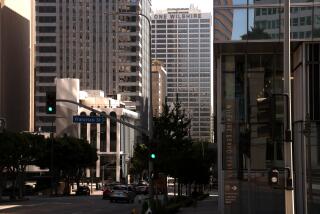UC San Diego Picked as Site of Super-Computer
- Share via
LA JOLLA — The University of California, San Diego, will be the site of one of four national super- computer centers being funded by the federal government to help maintain the supremacy of American scientific research, it was announced Monday.
The center at UC San Diego, estimated to cost about $100 million over a five-year period, will be operated by GA Technologies, a La Jolla research facility neighboring the campus and specializing in atomic energy.
UC San Diego and GA, a subsidiary of Chevron Corp., head a group of 18 universities and private companies that won one of four grants made by the National Science Foundation following funding authorization for the super-computers by Congress last year. Officials here hope to have the first phase operating by early next year.
Largest of Four
The San Diego consortium is the largest of the four selected by the foundation. The other centers will be located at Princeton University, the University of Illinois and Cornell University. Twenty-two university teams competed during the selection process.
Congress has authorized $40 million for the centers this year and is expected to add another $46 million next year. The UC San Diego center will eventually receive $60 million from the National Science Foundation, as well as $25 million from the 18-member consortium, $5 million from the state of California and $10 million in private industry grants.
The American scientific community has argued for several years that such centers are needed to the keep U.S. research ahead of that being done in Europe and Japan. The expense of such high-speed computers, which calculate at the fastest speeds now possible, mean that they cannot realistically be set up at individual universities but must be shared by a group of institutions.
“This is really a major, major event,” Chancellor Richard Atkinson of UC San Diego said Monday in announcing the federal grant.
“Congress, scientists, everyone has been talking about the need for super-computer centers of this type,” he said. “We have lost a little pace (scientifically) because we have not had the access (to super-computers).”
Useful in Science
Erich Bloch, director of the National Science Foundation, said in Washington that scientific breakthroughs increasingly depend on easy access to super-computers. Although American companies lead in the design of such computers, the United States has been lagging behind other countries in making them available to the university community. Bloch said that only private industry and government laboratories have used them with regularity.
A super-computer is defined generally as the fastest and most powerful computer available at any particular time. It operates hundreds of times faster than a normal industrial computer and thus is able to do scientific computations that would require prodigious amounts of effort on slower computers.
Sidney Karin, GA Technologies computer chief who will head the UC San Diego center, said that such computers have immediate application in numerous fields ranging from weather forecasting to computer designing of new drugs. He said that the use of super-computers to design the latest model of the European Aerobus jet airplane has resulted in a sleeker design compared to earlier models and the savings of hundreds of millions of dollars in fuel costs.
GA President Kerry Dance said that while the center will not result in profits for his firm, it will help the company’s image.
‘Real Prestige’
“It’s something of real prestige for the community,” he said.
The center will employ about 60 people full-time and be available to 200 researchers at any one time, Karin said. The National Science Foundation will set up guidelines for the use of the computers within the year.
Other California members of the consortium are UCLA, Stanford University, Caltech, Scripps Institution of Oceanography, Salk Institute for Biological Studies, Research Institute of Scripps Clinic, San Diego State University and the U.S. Southwest Fisheries Center in San Diego.
Times Staff Writer Bett Botts, in Washington, D.C., also contributed to this article.






